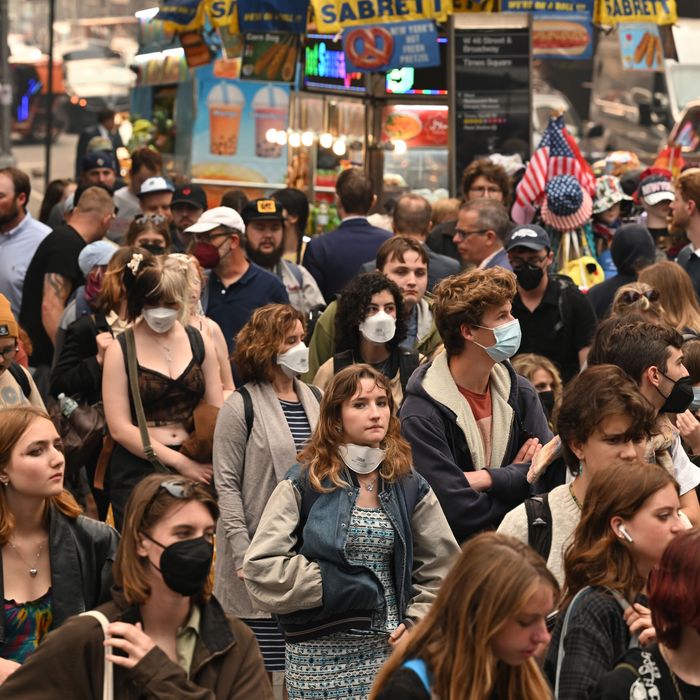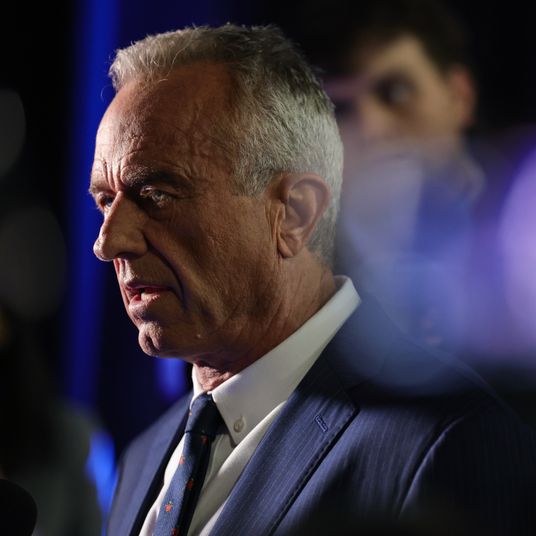
The wildfire smoke that turned Manhattan skies blood orange on Wednesday topped out at an air-quality index (AQI) of 352, the worst ever recorded in the city. The danger level was color-coded maroon, or “hazardous,” the most severe rating. The air looked and smelled apocalyptic, but how hazardous is “hazardous,” actually, for your health?
The short answer: It’s bad, but don’t panic.
Smoke pollution is made up of particulate matter (PM) called PM2.5, which consists of all microscopic bits of airborne debris smaller than 2.5 microns across, one-twentieth the width of a human hair and one-quarter the size of a piece of dust. A particle of smoke is too small to see with the human eye and too small to be filtered out with a surgical mask. When you breath in larger particles like grains of dust, they tend to settle on the upper surfaces of the lung, where they are swept up and out by hairlike structures called cilia. PM2.5 particles settle much deeper into the remote recesses, where the lung has no mechanism to remove them, or even penetrate directly into the bloodstream.
Smoke can also contain toxic chemicals like benzene and formaldehyde, but it’s the physical presence of the particles deep in the lung that causes the most immediate effects: irritation and inflammation as the body’s immune system activates to fight what it perceives as an invader. The result is coughing, wheezing, and shortness of breath similar to what one might experience as a result of a respiratory infection like the flu. As long as you’re healthy, when the danger level is yellow, “you’re going to be pretty much okay,” says Jennifer Stowell, a postdoctoral research associate at the Center for Climate and Health at Boston University, who studies the medical effects of wildfire smoke.
For people with preexisting conditions such as asthma, allergies, or COPD, the additional stress can worsen their condition enough to send them to the emergency room. Even healthy people, Stowell cautions, shouldn’t go for a run when it’s anywhere above green because higher rates of respiration effectively multiply the concentrations one is exposed to.
When the danger level is orange, red, purple, or maroon, “it’s very unsafe, very unhealthy, and very hazardous” for everyone, Stowell says. “Essentially, it doesn’t matter how healthy you are at that point, because the amount of concentration that is in every breath is going to overwhelm a normally healthy system. Your lungs just won’t work as they normally do.” Her advice: Stay indoors and turn on the AC or better yet an air purifier if you have one. If you have to go outside, the only effective air masks are N95s with double straps to ensure a tight seal around the face.
This week’s air-pollution spike will likely result in a surge of ER visits in the two to three days to come, but for most people, there’s no reason to expect long-term health effects, since a healthy body is able to quickly clear itself of particles and toxins. “Within just a day or two of the air quality being better, you should see most if not all of your symptoms disappear,” says Stowell.
Claims that short-term exposure to smoke can cause lasting physical harm, or that it is equivalent to smoking a certain number of cigarettes, should be taken with a grain of salt. Long-term health effects of wildfire exposure haven’t been well studied as yet, but it would probably take multiple years of seasonal exposure to trigger chronic health issues.
So for now, Americans shouldn’t worry too much about breathing smoke this week. Going forward, though, it could become more of an issue. “If climate change continues to drive wildfire activity to create these large smoke plumes that can reach places like New York or Boston, that will be a concern,” Stowell says, “because all of a sudden, populations here might start being exposed on a seasonal basis.”
More on Smokepocalypse
- Will New York See Another Smokepocalypse This Summer?
- The Wildfire Haze Is Coming Back to New York
- Canada Is on Fire. America Is Choking on Smoke. Is This the ‘New Abnormal’?






























